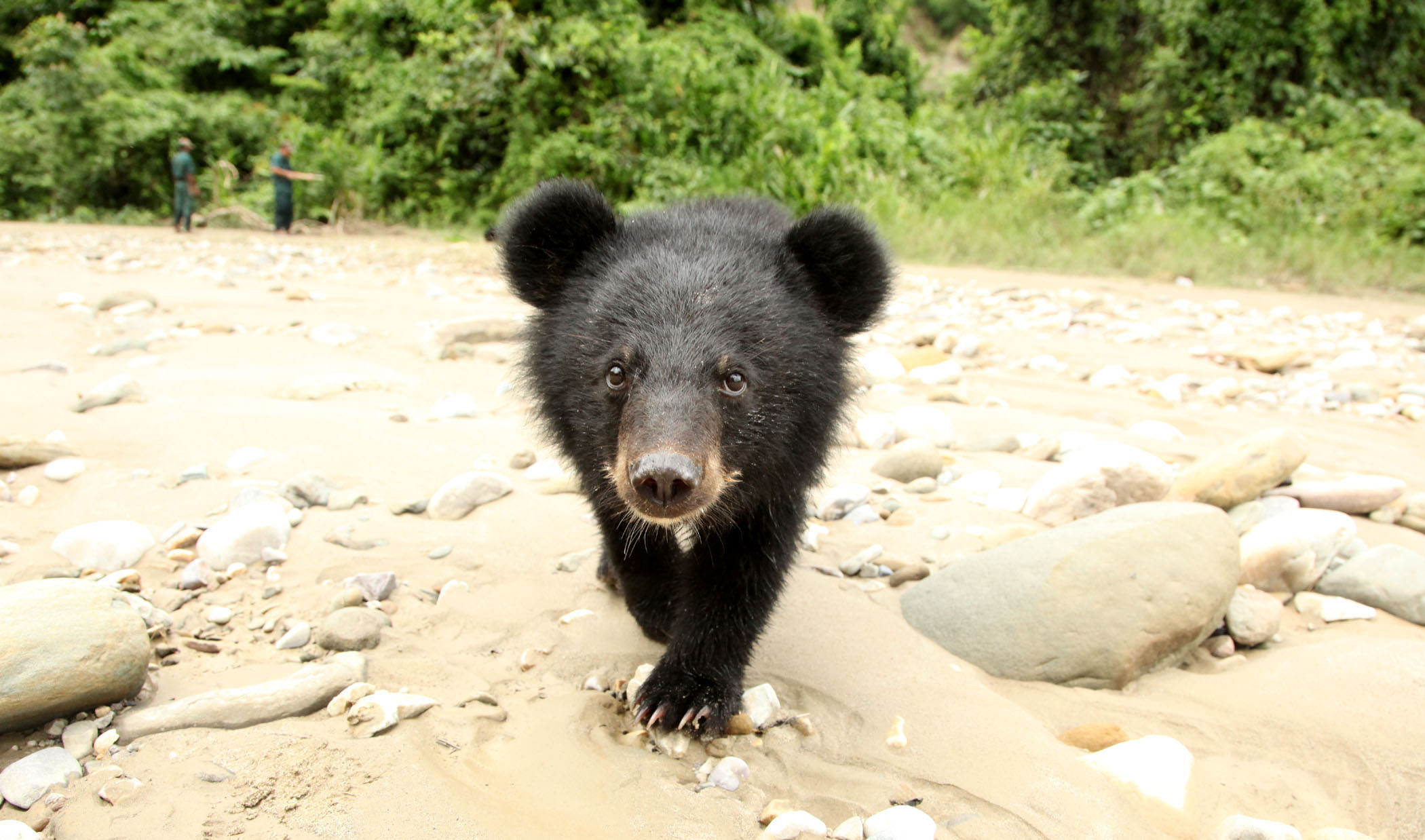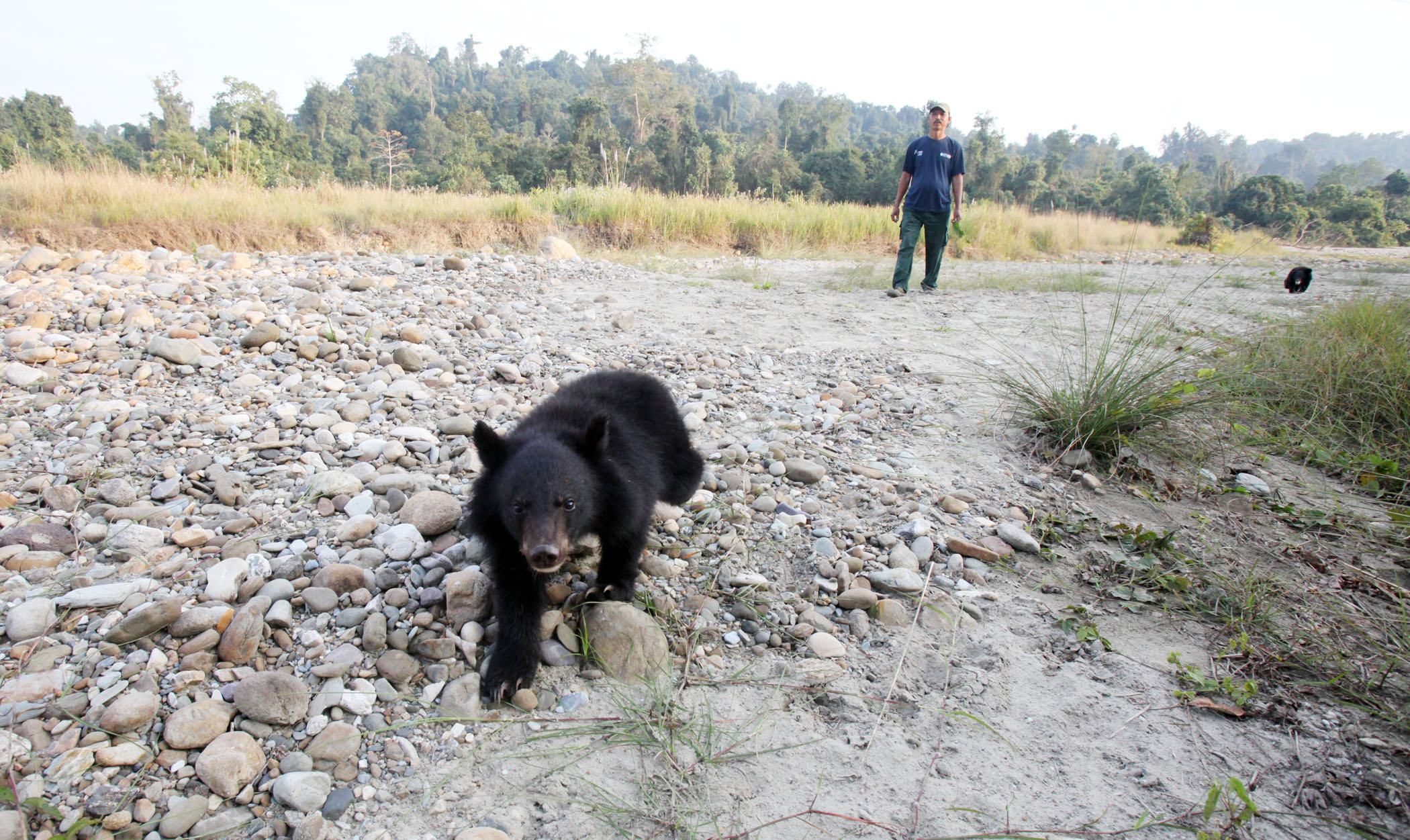A Striped Encounter
Hi, I am Ayushman Singh, and I work with WTI in rehabilitating orphaned Asiatic Black bear cubs, at Pakke Tiger Reserve, Arunachal Pradesh. Here we rescue and hand-raise orphaned bear cubs till they become independent to live on their own. We walk them on forest trails in an effort to make them forage on their own and get acclimatized to a life in the wild. Just like other mammalian cubs, bear cubs are dependent on their parents for food and security till they can fend for themselves. Like all other mammals they drink mother’s milk for upt 5-6 months of age and then start taking some solid food. Since they don’t know the ways to live and survive in the forest, the mother teaches them for the next 5-6 months or so to look for food, avoid predators and also hunt. Eventually as the cubs grow older and master the life sustenance skills they leave the mother and start living independently.
At the Centre for Bear Rehabilitation and Conservation (CBRC) which is a facility jointly established by WTI, IFAW and Arunachal Forest Department, we help them get back to the wild. Like all young mammals, bear cubs are playful and each individual has their own character, some like chilling in the freshwater streams, or sometimes snoozing up on treetops for hours on end often ignoring the calls of caregiving animal keepers.

This however, is not an account of bears but of a fleeting forest experience which shall remain engrained in my memory because of the sheer magic of the moment. An account of how a cub, his keeper and I saw an elusive and shy animal and how we three reacted to it.
It was the day after Christmas of 2020, me and Anthony our animal keeper who was raising a male bear cub named “Loki” in our forest camp. Loki came into our care when he was just a month old baby during the COVID-19 lockdown. , we had raised him and now he was learning how to walk and forage by himself in the core of Pakke Tiger Reserve.
Our bear walk routine in the forest is simple, we generally wake up by 5 am, freshen up and make breakfast and by 7:30 am we are done with our food and already decked up with our boots, leech socks and full-sleeved clothes to avoid ticks, insects and thorns we encounter in the forest. Anthony picks up the food for Loki that he had prepared the previous eve and we start walking towards his enclosure. Anthony then hides the food up a tree and then gets Loki out of his enclosure and we select an elephant track made by elephant herds climbing up the hills of Pakke. Locals call these tracks “Dundi”. That day, we had crossed a hill and had come down towards the river, Loki was enjoying a dip in the river while Anthony and me were discussing what route we should take next which could offer more food choices for Loki. Once our route was chosen we started walking, it would have been just half an hour after we started on this route when we heard a big commotion towards the right side of the river.
The forest in Pakke is very dense and the only open landscape is the river. The forest is habituated by elephants and the “Big guys” don’t like to be disturbed by us. Trust me you don’t want the elephants to know you are there. So all three of us stood and stared at the side where the huge commotion was happening. Anthony being a local and been brought up with the forest as his back yard immediately stopped and listened trying to identify the animal making the ruckus. Normally, when we come face to face with an elephant, Loki climbs up the nearest tree and looks at us trying to scramble and find a suitable place to hide or run. After the elephant leaves the area, we sneak back in, collect Loki and then continue on our walks as if nothing has happened.
Asiatic Black bears like to stand on their hind legs and check out a possible threat, so here we were silently staring at the commotion holding our breaths, all three of us on two legs when a huge Mithun or the gayal (Bos frontalis) called the mountain cattle tore through the forest and crossed the river. If you compare us and Arnold Schwarzenegger in his prime you can consider us the normal cattle and the Mithun as Arnold. This bodybuilder animal ran at full speed across the river in front of us around 20 meters. My eyes were fixed on it as it was the first time I had seen such a huge mithun and that too galloping away at full speed.

It was then Anthony spotted the reason why the Mithun was galloping away at full speed and the second I saw it a chill ran down my spine, I knew Loki would escape, but Anthony and I were only 20 meters from it and I had no plan as to what to do so we just stood there. A 5-7 yr old Tiger wet till his shoulders in mud and water and its orange-brown coat glimmering under the afternoon sun with black stripes was very elegantly chasing after the Mithun. I remember thinking that it moved like a flash and I never heard any sound even while it crossed the river, with its eyes on the target. The whole interaction lasted six seconds the longest six seconds I have ever counted. The Tiger only saw the Mithun and didn’t even turn its head to see us. I don’t know why that bothers me and it didn’t (come to think about it), its focus was entirely on its prey. Anthony and I remained transfixed at the spot, I had expected that Loki would find shelter in the nearest tree but no, all three of us stood there and saw what we saw.
After having witnessed this, Anthony quickly took us to the side where the tiger had emerged from and we made a detour to avoid any more situations like this. About ten minutes later we heard a screech and Anthony gave me a look saying that the Tiger will not go hungry today. We still had like 2 hours before we could get back to the camp in the safety of our “Chang Ghar” a special type of treehouse (made of stilts) the keepers and the biologist stay in while we walk the bears. Before the advent of RCC houses, Arunachali tribes lived in houses like this. That night sitting in front of the kitchen fire Anthony and I reminisced about the our experience that afternoon and how magical it was. I will always remember this as during those 6 seconds I was fascinated and terrified and I have never felt this way before the way that tiger made me feel that afternoon by the river.
Ayushman Singh
OIC and Biologist
Center for Bear Rehabilitation and Conservation, Pakke
WTI









